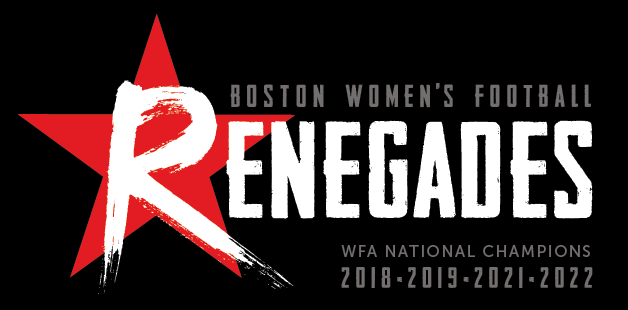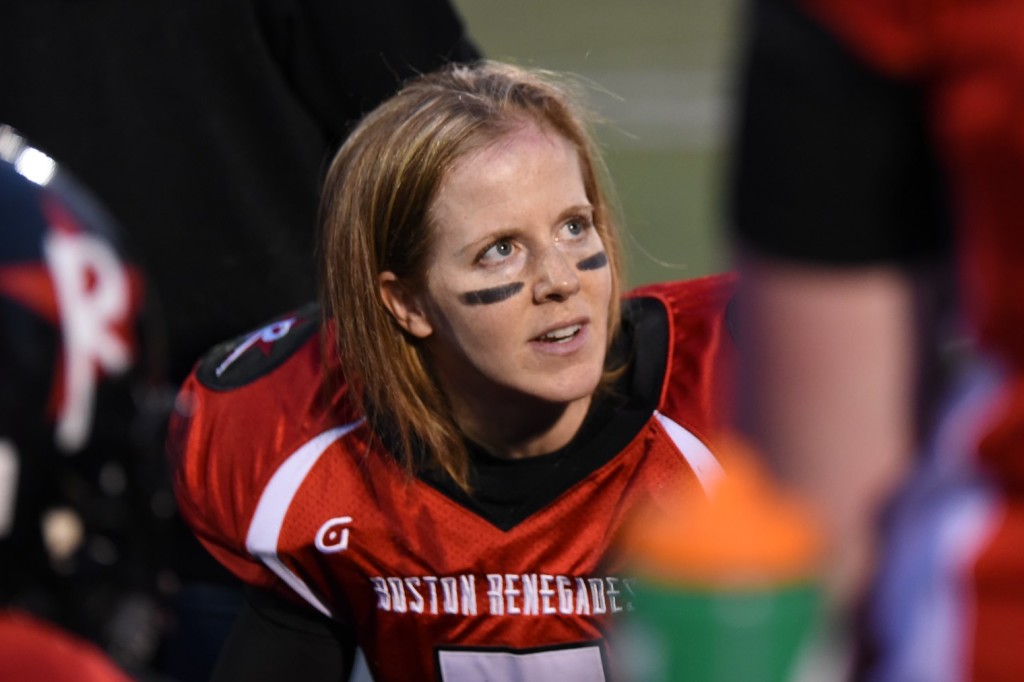By Shira Springer | Sports Business Journal
We are not trying to make any kind of statement; We just love the sport of football and play it for all the same reasons that men do.
—Allison Cahill, Boston Renegades
February 17, 2020
What happens when companies use female empowerment to sell products? Sometimes you get a Super Bowl commercial like the one Secret commissioned.
In case you missed it, the one-minute spot takes place in a packed football stadium. The game is on the line. The “Secret kicker” prepares for a crucial field-goal attempt. The ball sails through the uprights. The crowd goes wild. Then, the kicker and the holder remove their helmets to celebrate the win. The big reveal: They’re women! They’re actually two players on the U.S. women’s national soccer team — Carli Lloyd and Crystal Dunn — in football uniforms.
When fans see that two women pulled off the big play, they’re shocked into silence for a moment then cheer wildly again. The tagline “Let’s kick inequality” appears.
The commercial received mixed reviews. Some saw the spot as an awareness-raising vision of what’s possible. Many others thought the message boiled down to: Surprise! Female athletes are just as good as male athletes and worthy of attention. That message doesn’t reflect the current state of women’s sports. Female athletes no longer have to prove themselves worthy, especially not against male athletes. Their talent shouldn’t be a surprise. In the arenas where Lloyd and Dunn excel, their talent is more awe-inspiring than what the commercial staged.
Lloyd and Dunn played before packed stadiums en route to the U.S. winning the 2019 Women’s World Cup. Plus, 82 million fans worldwide watched the final on television.
If you want to kick inequality in women’s sports today, then you need to find ways to give female athletes more pay, more sponsorship money and more respect. No surprise there, either. And, sorry, dressing Lloyd and Dunn in football uniforms for a Super Bowl commercial doesn’t come close to doing any of that. It actually raises awareness about a troubling trend: Companies pushing female empowerment in advertising, but not taking action to fight inequality and be part of the solution. Or, even worse, publicly signaling they’re all in on empowerment and privately holding women back.
Remember Nike’s “Dream Crazier” commercial about female athletes pushing the boundaries of what’s possible and ignoring the naysayers? It celebrated the ambitions and accomplishments of female athletes with the tagline “It’s only crazy until you do it.” It was a powerful message. But the message was at odds with how Nike treated its pregnant athletes. The company reduced the contracts of women who were expecting. Female athletes affected by Nike’s punitive maternity policy bravely pointed out the hypocrisy in the New York Times.
What needs to happen when companies use female empowerment to sell products? Their message needs to match their actions inside and outside of corporate headquarters. And there needs to be action. You can’t be all about empowerment in a Super Bowl commercial, then not support women’s tackle football. Somewhere along the line Secret realized that.
Shortly after the Super Bowl, Wyn Dominy received an email from Secret. It read: “We want to talk to you ASAP.” Secret reached out to Dominy because she’s director of operations for the Women’s Football Alliance (WFA). She also owns the Mile High Blaze, the league’s Denver-based team. The WFA is a full-contact women’s football league that started play in 2009. The top division features eight teams from across the country, including the two-time defending champion Boston Renegades. Secret emailed because it wanted to directly support the league.
Last week, a new Secret ad asked, “Still sweating inequality?” The print ad featured Lloyd and Dunn in their football uniforms with helmets in hand. It also offered another big reveal. In a paragraph at the bottom of the ad, beneath some social media praise for the Super Bowl commercial, Secret announced a partnership with the WFA. That partnership means the league will have its national championship televised for the first time. That’s a big coup for a league many sports fans don’t even know exists.
Secret believes strength is more than overcoming what makes us sweat. We are proud to announce our partnership with the Women’s Football Alliance to air their National Championship on TV for the first time ever. Let’s be on the right side of history and #KickInequality pic.twitter.com/UXxOrowulE
— Secret Deodorant (@SecretDeodorant) February 9, 2020
“Hopefully, we can capitalize on this and it’s kind of a tipping point,” said Allison Cahill, the Renegades quarterback. “I like to think it only takes one, one big noteworthy sponsor, to spread our message to an audience that hasn’t received it.”
What exactly is that message? “Yes, we are challenging that tradition [of football as a men’s sport], but not because we are trying to make any kind of statement,” said Cahill. “We just love the sport of football and play it for all the same reasons that men do.”
Of course, that message doesn’t get out unless people know about the league and watch its games. That’s true for so many women’s sports, especially sports that don’t get the cyclical attention that comes to soccer or basketball or ice hockey. That makes the Secret partnership not only a potential tipping point for women’s football and the WFA, but for other lesser known women’s sports and smaller leagues. If companies want to attach their brands to female empowerment through women’s sports, there are plenty of partners out there. They are ready and waiting. Pick one.
Companies need to be accountable to their messaging around female empowerment in meaningful, visible ways. Otherwise, it’s empty, inauthentic messaging that won’t sit well with sports fans or consumers or athletes or all of the above. See Nike: In the face of criticism, the sportswear behemoth changed its maternity policy so it better supports its sponsored athletes through pregnancy and afterward.
One change Secret might consider for its next Super Bowl commercial: Featuring women’s football and paying WFA players to star in it.
Shira Springer (saspring@bu.edu) covers stories at the intersection of sports and society for programs on NPR and WBUR, writes a column on women’s sports for the Boston Globe and teaches journalism at Boston University.

